Harold Davis's Blog, page 144
December 3, 2015
Photographing the Bridge of Sighs at Night
The Ponte dei Sospiri, or Bridge of Sighs, is one of the most famous landmarks in Venice, Italy. It connects the Doge’s Palace with a prison on the opposite side of the canal. The name, coined by Lord Byron, comes from the idea that prisoners would sigh at their final view of beautiful Venice through the window before being taken across to their grim cells, often to remain imprisoned for the rest of their lives.

Bridge of Sighs at Night © Harold Davis
Today, the main problem confronting the photographer wanting an interesting image of the Bridge of Sighs is other photographers. Specifically, groups of tourists, many of them Chinese, jostling with selfie sticks on the Ponte della Paglia, with the Bridge of Sighs in the background.
During daylight hours, it is almost impossible to place a tripod in position for this classic view without having the legs knocked into by an eager tourist-with-selfie-stick. In this situation, the photographer is often solicited to shoot group selfies (is “group selfie” an oxymoron?) with someone’s phone camera.
But on a dark, damp, and foggy night there is no one around. What a perfect time to capture a somewhat different version of the famous Bridge of Sighs!

December 2, 2015
San Giorgio Boat Harbor in Sepia
On a Venetian morning socked in with fog, my friend Mauro and I took the vaporetto across to the island of San Giorgio. The normally inspiring view from the top of the San Giorgio campanile was a blank white wall. But the boats in the nearby harbor were moving slightly, putting me in mind of sepia Dutch nautical drawings.

Tall Ships © Harold Davis
Exposure data: Nikon D810, 105mm, +4 ND filter, circular polarizer, 2/5 of a second at f/36 and ISO 31, handheld with a slight intentional up-and-down motion; processed in ACR and Photoshop, using the Simplify, Glow, and Impressions plug-ins from Topaz Labs.

December 1, 2015
Early registration discount—$500 off autumn photography in Italy
As actor Richard Gere has said, “NEVER turn down an opportunity to go to Italy!!!” We are pleased to offer a $500 per person early-registration discount on our 2016 destination photo workshops to Tuscany and to Venice. SO: Never turn down Italy, and don’t miss the savings for early registration!
Click here for details about Under the Tuscan Skies with Harold Davis, and here for more information about Photograph Venice with Harold Davis.

November 30, 2015
Photograph Paris in the Spring: Two spots left
And now for something completely different…
This is an in-camera double exposure I made on Saturday. The model is Anastasia Arteyeva.

Shelter Within © Harold Davis
Related images: View more of my Multiple Exposures (slide show).

November 26, 2015
Lost City in Sorrento
Adjacent to the center of picturesque Sorrento, Italy two chasms meet. Long ago, rivers in these gorges flowed cleanly down to the ocean, and were the original settlement in the area. Over time, and thanks in part to construction of the new town of Sorrento, the area became isolated from the harbor and increasingly damp. In modern times, it has been abandoned to the ferns and other vegetation, although the old mill shown in these photos was in use until the late 1800s.

Lost City © Harold Davis
Known as the “Valley of the Mills,” a very short walk from the Piazzo Tasso in central Sorrento leads to a vista point. The Valley of the Mills itself is surrounded by luxury hotels. For me, the most interesting thing visually about the scene is the way the modern city sits right on top of the ancient lost city, with little to differentiate the two—except that the lost city is buried in ferns and slowly and romantically reverting to the materials of the rugged chasms in which it lies.

Lost City 2 © Harold Davis

November 25, 2015
Hieroglyphic or La Dolce Vita
Sunbathing on the boat ramp in Riomaggiore harbor could be La Dolce Vita—the sweet life, and the name of a 1960 Fellini film. Except that the angle of repose causes most of these couples to anchor themselves using wood slots to stop from sliding into the water. Alternatively, as one commentator noted, photographed from above, La Dolce Vita looks for all the world like an abstraction, or a hieroglyphic.
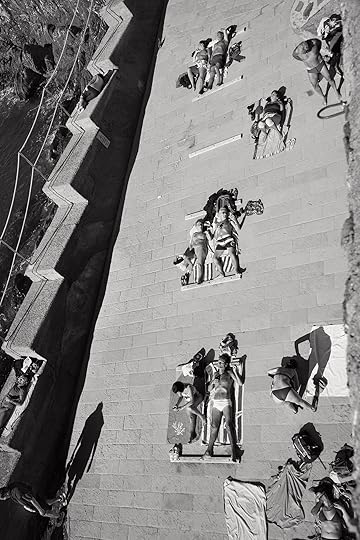
Riomaggiore, 2015 © Harold Davis

November 24, 2015
Photograph Venice with Harold Davis (November 2016)
Photograph Venice with Harold Davis—click here for full details and itinerary!
November 6 – November 12, 2016 (seven days and six nights); $6,195 per person (single supplement $425).
Click here to download the Reservation Form. Early registration discount ($500 off) applies for registrations by December 31, 2015.

Venice of Dreams © Harold Davis
Venice is the largest preserved antique city in Europe, and possibly the world. Extravagant, decadent, charming with ever-changing light, Venice is a photographer’s delight with its fairy-tale canals and endless maze of footpaths and bridges.
Join acclaimed photographer Harold Davis for the experience of a lifetime exploring and photographing La Serenissima, the most serene and exciting Republic of Venice. There you’ll have the opportunity to experience firsthand the places and sights that have inspired artists for centuries.
We’ll focus our lenses on canals, reflections, and the infinite wonder found around every corner in Venice. There will be special emphasis on techniques for impressionistic rendering, and several sessions will be held to teach the related post-production techniques, as well as how best to use an iPhone camera in Venice.
Guided tours of the Doge’s Palace, the Basilica of San Marco, and the Peggy Guggenheim collection are included. We will also explore with our camera many well-known and secretive locations on foot and vaporetti. These include the island of San Gorgio, across the water from San Marco; Murano, the famous island where glass blowing techniques originated; and Burano, a quiet island in the Venice lagoon whose inhabitants make lace and live in colorfully painted houses.
Non-photographic spouses are welcome (there’s plenty to do in Venice besides photography, including cultural and shopping activities!). The group is strictly limited to ten participants.
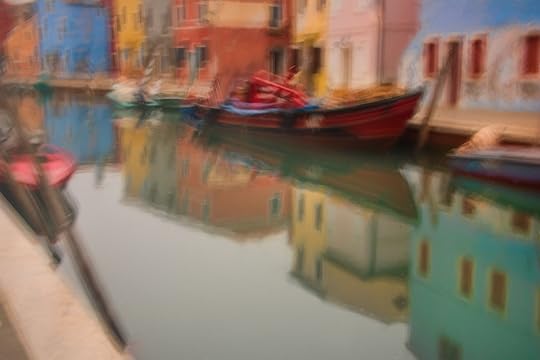
Burano © Harold Davis
Where: The group will be based at the Hotel Flora, a unique and charming Venetian hotel that is an oasis of calm and centrally located a very short walk from Piazza San Marco.
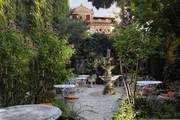
Hotel Flora Garden

Hotel Flora – Stairs
When: Sunday November 6, 2016 (leave US November 5) to Sunday November 12, 2016 (six nights and seven days).
Group Size: This exclusive, small photo workshop tour is limited to ten photographers (non-photographer significant others are also welcome).
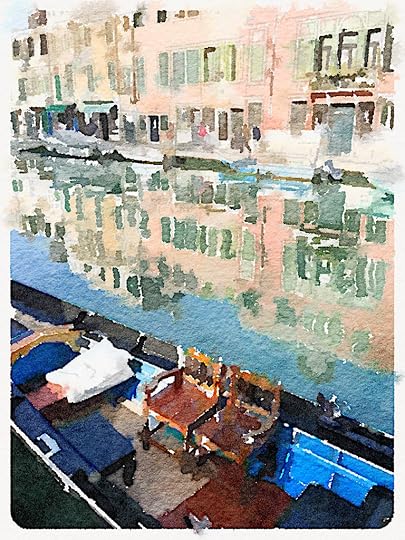
Venice Gondola © Harold Davis
Cost: $6,195 per person (single supplement $425). $500 early-registration discount for enrollment by December 31, 2015.
Click here for complete itinerary with a list of inclusions and exclusions.
To Register: Please send us an email expressing interest right away; a completed registration requires a $1000 deposit and Reservation Form, and a copy of your passport page.

Venice in a Silver Light © Harold Davis

November 23, 2015
Under the Tuscan Skies: Photograph Tuscany with Harold Davis (October 2016)
Under the Tuscan Skies: Photograph Tuscany with Harold Davis—Click here for full details and itinerary!
October 22 – October 29, 2016 (eight days and seven nights); $4,895 per person (single supplement $675);
Click here for Reservation Form (PDF). $500 early registration discount for registrations by December 31, 2015.
Imagine photographing the autumn vistas under the Tuscan skies! Where fertile land meets the patterns of traditional farming we will photograph olive groves and cypress trees. A deluxe, renovated antique farmhouse near Siena will be our home base as we experience great Italian cooking and the fellowship of talented photographers. Workshop size is strictly limited because we have exclusive use of the farmhouse, and bedrooms are limited.
While we photograph, we will be surrounded by the intimate details of the working farm, which produces organic olive oil and wine. If it is chilly, we will move in beside the word-burning stove, otherwise we will discuss philosophy and photography on the veranda under the Tuscan skies.
This destination photo tour will begin with a guided exploration of Florence. The next day, we’ll move on to the weird antique skyscraper towers of San Gimignano. We’ll explore the strikingly beautiful hill town of Volterra, the ins and outs of Sienna, the Val ‘Orcia countryside, Montepulciano, Pienza, Montalcino, and more.
The workshop will be enhanced by the hands-on guidance of master photographer Harold Davis, who will focus on the earth and sky of Tuscany in black and white and color, and help each participant to create their best work in an inspirational location.

Ponte Vecchio Night Reflections © Harold Davis
Where: The group will meet at the Hotel Balestri in Florence, a boutique 4-star hotel on the banks of the Arno River not far from the Ponte Vecchio.
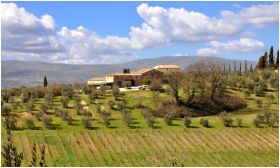
Agriturismo Marciano Farm
After exploring Florence, we will transfer by private coach to Agriturismo Marciano in the heart of Tuscany. Agriturismo Marciano is a deluxe, renovated ancient farmstead that the group will have exclusively for the week. The ancient Marciano farmhouse dates to the 1700s. Today, the family-run farm is a green oasis surrounded by vineyards and olive trees—the expression of a serene country lifestyle, and genuine traditional organic farming practices.
When: Saturday October 22, 2016 (leave US October 21) to Saturday October 29, 2016 (seven nights and eight days).
Group Size and non-photographers: This exclusive, small photo workshop tour is limited to ten participants. Non-photographer significant others are welcome, but will count towards the total (so there will be no more than ten people).
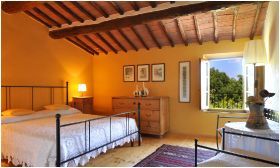
Agriturismo Marciano Room
Cooking lessons, and a syllabus in vine growing, wine making and wine tasting are available for non-photographers with advance notice (and subject to additional cost).
Cost: $4,895 (single supplement $675). $500 early-registration discount for enrollment by December 31, 2015. Click here for Reservation Form.
Click here for a complete itinerary, with a list of inclusions and exclusions.
To Register: Please send us an email expressing interest right away; a completed registration requires a $1000 deposit and Reservation Form, and a copy of your passport page.

Florence and the Arno River © Harold Davis

November 22, 2015
Canyon Conundrum
The seaside village of Vernazza, Italy makes its living from catching fishes and catering to tourists. Carved into the rocky ledges of the Ligurian coast, behind the village facade facing the sea is a warren and maze of narrow, dark passages with twisting stairs and low tunnels.

Canyons of Vernazza © Harold Davis
Wandering into this maze with my camera and tripod, I felt an eerie sense of having faced similar photographic challenges before. With the narrow, enclosed spaces and the mere glimmer of the sky, the compositional and lighting challenges were much the same as those in the slot canyons of the American southwest.
Both environments present a dynamic range from blackest black to brightest white, and both involve creating images that turn narrow spaces into interesting creative expressions. Strangely, while taking my time in the depths of Vernazza I could almost feel the dry, sandy breath of Antelope Canyon, on Navajo territory near Page, Arizona.

Structure of Time © Harold Davis
Related stories: Orange Juice on the Cinque Terre Trail; Structure of Time; Slot Canyon.







